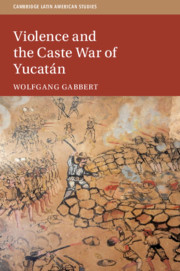Book contents
- Violence and the Caste War of Yucatán
- Cambridge Latin American Studies
- Violence and the Caste War of Yucatán
- Copyright page
- Dedication
- Contents
- Illustrations
- Acknowledgments
- Introduction: Caste War Violence – Prospect and State of the Art
- Part I Violence and War
- 1 Violence in Anthropological and Sociological Perspective
- 2 Violence in Organized Groups
- Part II Violence in Yucatán Before and Beyond the Caste War, 1821–1901
- Part III The Caste War and Violence: An Overview
- Part IV Violence and the Government Forces
- Part V Violence and the Kruso’b
- Part VI Intricacies of Caste War Violence
- Appendices
- Bibliography
- Index
- Other Books in the Series (continued from page ii)
2 - Violence in Organized Groups
from Part I - Violence and War
Published online by Cambridge University Press: 09 August 2019
- Violence and the Caste War of Yucatán
- Cambridge Latin American Studies
- Violence and the Caste War of Yucatán
- Copyright page
- Dedication
- Contents
- Illustrations
- Acknowledgments
- Introduction: Caste War Violence – Prospect and State of the Art
- Part I Violence and War
- 1 Violence in Anthropological and Sociological Perspective
- 2 Violence in Organized Groups
- Part II Violence in Yucatán Before and Beyond the Caste War, 1821–1901
- Part III The Caste War and Violence: An Overview
- Part IV Violence and the Government Forces
- Part V Violence and the Kruso’b
- Part VI Intricacies of Caste War Violence
- Appendices
- Bibliography
- Index
- Other Books in the Series (continued from page ii)
Summary
The chapter gives a short description of Yucatán’s key social characteristics in the nineteenth century, allowing the reader to place subsequent chapters in their historical context. While the characterization of the Caste War by the elite as a racial struggle against progress is grossly misleading, it reflected the post-colonial nature of the Yucatecan society. The structure of the population in the region, its economy and hegemonic worldview were the product of three centuries of Spanish colonial rule in a relatively poor and isolated part of the Viceroyalty of New Spain. Colonial society was always more complex than the rigid dichotomy between conqueror and conquered or Spaniard and Indian (or Maya) permits. However, the persistence of colonial structures and the enduring importance of racist arguments in the elite discourse following Yucatán’s independence from Spain in 1821 are fundamental to understanding the conflicts that led to the outbreak of the Caste War and its interpretation by numerous contemporary observers as a racial fray.
- Type
- Chapter
- Information
- Violence and the Caste War of Yucatán , pp. 23 - 30Publisher: Cambridge University PressPrint publication year: 2019

